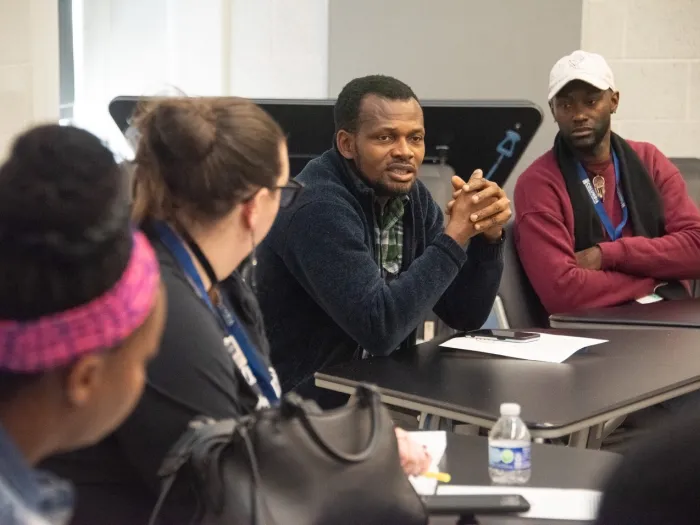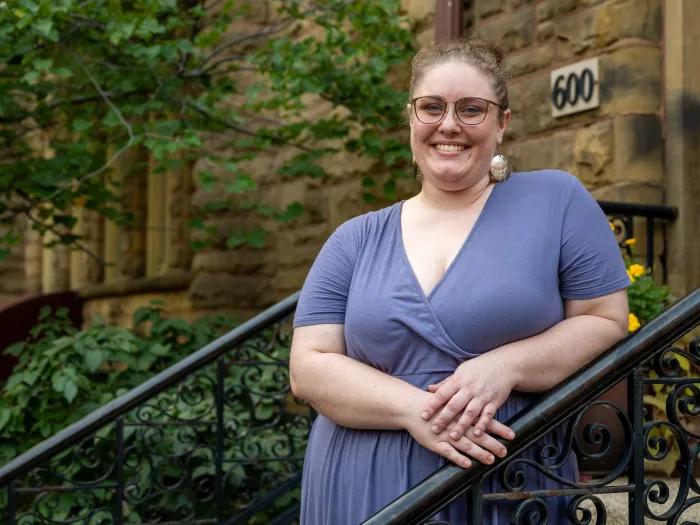March Advocacy Hour webinar dives into immigration issues
Hundreds of people tune in to hear from those ministering to those with and without documents

The Office of Public Witness of the Presbyterian Church (U.S.A.) hosted the second of its new monthly Advocacy Hour webinars on Wednesday, with a focus on immigration. The 90-minute virtual gathering drew more than 500 registrants from across the country, including pastors, elders, other church leaders and nonprofit professionals. Participants were notified at the beginning of the event that, in a departure from standard practice, this webinar would not be recorded out of respect for its sensitive nature and concerns for safety.

The webinar officially began with a recorded greeting and reading of Isaiah 41:10 in Spanish from Omar Chan, project manager for Mid Council Ministries, who introduced himself as a naturalized citizen originally from Guatemala and expressed empathy for all those migrants and immigrants —both with and without documents — experiencing fear and persecution in these times.
Amanda Craft, manager of advocacy in the Office of Immigration Issues, invited webinar attendees to engage in a practice called “Presente!” which, she explained, arose out of El Salvador during the time of armed conflict the country endured in the 1980s and early 1990s. She asked participants to name, while muted, those who have been lost to arrest, detention, and deportation in recent days, while honoring them with “Presente” in the community chat space. The chat quickly filled with a silent but visually striking repetition of the word.
Craft then offered an overview of current federal policies around immigration, delineating three strategy “buckets” or areas the current administration is using to implement and enforce anti-immigration action. Those three approaches included using “invasion” language to implement policies formerly used during times of war, using immigration status and related laws for foreign policy purposes, and using immigration enforcement policies to stoke fear, enact cruelty, and increase risk.
Craft offered chilling examples of each of these strategies in action. She described the housing of detainees in non-U.S. locations and the Alien Enemies Act of 1798. She pointed to the detainment of activists, Mahmoud Khalil and Jeanette Vizguerra. And finally, she noted the demeaning rhetoric used to refer to immigrants and migrants by the highest offices of the government, as well as the recission of sensitive locations protections.
On this final topic, Craft informed participants that the Rev. Jihyun Oh, in her role as Stated Clerk of the General Assembly and acting on behalf of the General Assembly, joined 27 other religious denominations in filing a lawsuit against the Department of Homeland Security for the recission of sensitive locations protection policies. The first hearing for that case, Craft announced, will take place on April 4 in U.S. District Court in Washington, D.C.
As the webinar continued, content shifted to a virtual panel, with each panel member having their own chance to share with those gathered about their experiences.
The first panel member shared about her experiences as pastor to a Hispanic immigrant community. She shared on condition of anonymity, with her written reflections shared aloud by Craft. This pastor shared how crucial her church is to its immigrant members, providing belonging that they often don’t experience anywhere else. The pastor said that the impact of recent anti-immigrant policies from the Trump administration has been palpable, with many afraid to attend worship or even leave their homes. The heightened fear and risk are felt by both those with and those without documentation, as even being a Spanish speaker can lead to questioning.
When asked what others could do to show support, the pastor encouraged people to utilize their privilege, their voice, and their stability to vocally defend others who cannot speak out themselves for fear of retribution. She also said that any support from other churches, including financial, emotional, and spiritual care, made a world of difference to the congregation.
The second panelist spoke from his context as the pastor of a mid-sized, 95% white congregation in Nebraska, which shares community with a number of Spanish speakers. This pastor described the ways his congregation has supported and built relationships with their Spanish-speaking neighbors over the past eight years, and in the wake of January’s inauguration.
These efforts began with free Spanish classes for church members to communicate and build relationship with their neighbors. Eventually, the church became host to a number of community groups and events, including health seminars in Spanish, a successful taco truck business, and a Mexican folkloric dance troupe which performs during worship several times a year.
More recently, the Nebraska church has worked with another local group to provide “Know Your Rights” seminars for the community about immigration policies and constitutional rights that transcend citizenship status. They also worked with Presbyterian Disaster Assistance and the Office of Immigration Issues to ensure legal protections around their community center as private property so that Spanish-speaking groups could continue to use the space without fear of government interference. He said most of all, he and his congregation try to stay attentive to the needs of the moment and provide whatever tangible and intangible support they can.
The final panelist offered his perspective as an African immigrant, an employee within the racial equity ministries of the Interim Unified Agency, and as the pastor to an African immigrant congregation. He said that currently in his congregation of roughly 50 people, more than a dozen are engaged in some sort of legal process around the immigrant status, including one naturalized citizen who was detained upon their return to the United States.
While emphasizing that Africa is a continent of 54 countries each with their own cultures and context, this pastor noted that a shared cultural tendency among African immigrants in the U.S. is to “underground” during times of heightened risk. They would be unlikely, he said, to engage in vocal activism or participate in webinars such as this one. The most significant need and challenge for those seeking so support such immigrant communities, according to the third panelist, is building firm trust.
As the third panelist concluded his portion, Craft lifted up the ways in which pastoring to an immigrant congregation is a unique call with unique needs, and that mid councils accompanying such leaders should remember that.
The content portion of this month’s Advocacy Hour concluded with some practical tips from Omar Salinas-Chacon, a ministry specialist within PDA, as well as a time for questions. Salinas-Chacon emphasized the importance of not assuming that they’re already hearing from constituents or that they know how voters they represent feel. He warned participants not to assume lawmakers affiliated with a given political party will always vote a particular way.
Salinas-Chacon encouraged attendees to contact their legislators, explaining that they get counts of how many calls and messages they receive in support of or against certain policies and it informs their votes. Webinar leaders also clarified, in response to questions, that both emails and calls are effective, and both are more effective whenever they include personal stories or perspectives.
As the webinar event shifted into a time of community action led by the Rev. Christina Cosby, Craft shared with participants that an interfaith prayer vigil has been organized for 6:30 p.m. Eastern Time on April 3 at National City Christian Church in Washington, D.C. The vigil is being held the night before the sensitive locations hearing. The vigil will be available online via livestream. Register for the livestream here.
While the content portion of the webinar concluded at the end of the first hour, those who could were invited to stay and provided a script to make calls to their legislators in response to H.R. 32, the No Bailout for Sanctuary Cities Act. Those who made these calls were also given time together in small groups to debrief the experience afterwards, before the program ended.
Advocacy Hour webinars take place on the fourth Wednesday of every month at noon Eastern Time. The next webinar will take place on April 23 and will focus on issues around hunger, both domestically and internationally. It will be led by the Presbyterian Hunger Program and partners.
You may freely reuse and distribute this article in its entirety for non-commercial purposes in any medium. Please include author attribution, photography credits, and a link to the original article. This work is licensed under a Creative Commons Attribution-NonCommercial-NoDeratives 4.0 International License.




